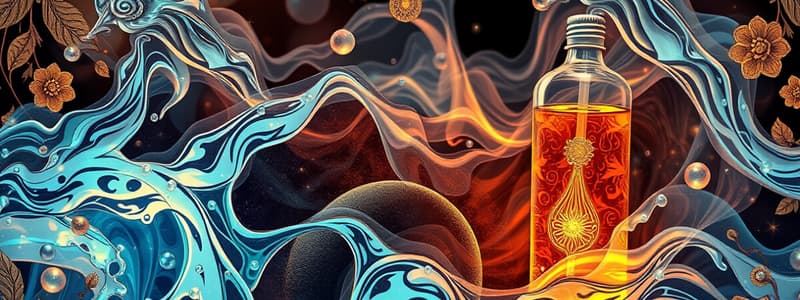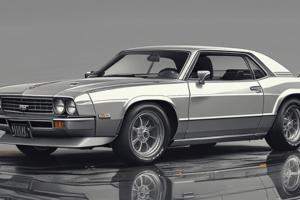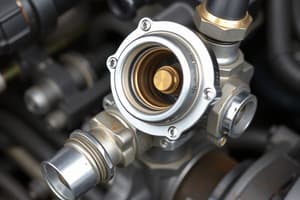Podcast
Questions and Answers
Coolant is water and ___________.
Coolant is water and ___________.
ethylene glycol
As the percentage in antifreeze in coolant increases, ________________.
As the percentage in antifreeze in coolant increases, ________________.
the freeze point decreases (up to a certain point)
Adding a chemical to make coolant bitter to the taste is called ____________.
Adding a chemical to make coolant bitter to the taste is called ____________.
embittered
What type of coolant is Asian red coolant?
What type of coolant is Asian red coolant?
What type of coolant is DEX-COOL?
What type of coolant is DEX-COOL?
What color is PHOAT coolant?
What color is PHOAT coolant?
DEX-COOL is ________.
DEX-COOL is ________.
Who is correct about testing coolant for proper pH?
Who is correct about testing coolant for proper pH?
Reusing old coolant is generally not approved by vehicle manufacturers except_______________.
Reusing old coolant is generally not approved by vehicle manufacturers except_______________.
Which technician is correct regarding the electrolysis problem?
Which technician is correct regarding the electrolysis problem?
Water boils at ________.
Water boils at ________.
Water freezes at ____________.
Water freezes at ____________.
What is a refractometer?
What is a refractometer?
What is galvanic activity?
What is galvanic activity?
What is electrolysis?
What is electrolysis?
What is passivation?
What is passivation?
Flashcards are hidden until you start studying
Study Notes
Coolant Composition and Function
- Coolant primarily consists of water and ethylene glycol, serving as a temperature regulation agent in engines.
- Increasing the percentage of antifreeze in coolant lowers the freeze point, enhancing its performance in colder conditions.
Chemical Treatment and Types of Coolants
- Coolant can be embittered, meaning a chemical is added to give it a bitter taste, discouraging accidental ingestion.
- Asian red coolant is categorized as HOAT (Hybrid Organic Acid Technology).
- DEX-COOL is an OAT (Organic Acid Technology) coolant, known for its extended life and specific chemical properties.
- PHOAT (Partially Hybrid Organic Acid Technology) coolant is identifiable by its dark green color.
Coolant Chemical Properties
- DEX-COOL is free from silicate and phosphate, which distinguishes it from traditional coolants.
- Technician A claims that new coolant has a pH above 7, which decreases with engine use, while Technician B notes that OAT and HOAT coolants start with a lower pH than older IAT coolants; both statements are correct.
Manufacturer Guidelines and Testing Methods
- Most vehicle manufacturers do not approve the reuse of old coolant, with the exception of Mercedes-Benz.
- A voltmeter can be employed to check for issues in coolant; a reading of 0.2 volts when the engine is off and 0.8 volts when running indicates potential problems. Technician B, who suggests inspecting ground wires and connections, is correct.
Physical Properties of Water
- Water boils at 212°F at sea level, a critical temperature for engine performance.
- Water freezes at 32°F, important for understanding coolant intervention in winter conditions.
Testing and Chemical Reactions
- A refractometer is used to assess the freezing point of coolant by examining a few drops on a prism.
- Galvanic activity occurs when electric current flows between two metals without an external voltage source, posing risks for coolant systems.
- Electrolysis involves electric flow resulting from an external voltage source, potentially causing deterioration in engine components.
- Passivation refers to the chemical reaction between coolant and the metal it protects, essential for preventing corrosion and ensuring longevity.
Studying That Suits You
Use AI to generate personalized quizzes and flashcards to suit your learning preferences.




